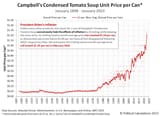Search Results
7/13/2025, 4:14:43 AM
>>510228269
>Current economic thought is deflation is worse than inflation
That's because when running huge deficits, the LAST thing you want is to have to pay back the debt with money that has higher purchasing power than the money you originally borrowed.
Deflation benefits savers and creditors. Inflation benefits debtors and spenders.
Here's a small example from real life. Costco had a sale on Nescafe instant coffee. We bought a dozen (maybe a year's worth) because we know the price will be going up over time. The last time we bought a bunch on sale, price was $7.99. The sale price now is $11.99.
We chose to spend the money now because we believe the spending power would decrease over time. Contrast that with the price of Campbell's condensed tomato soup which remained constant at around 10 cents per can from1895 to the 1970s.
>Current economic thought is deflation is worse than inflation
That's because when running huge deficits, the LAST thing you want is to have to pay back the debt with money that has higher purchasing power than the money you originally borrowed.
Deflation benefits savers and creditors. Inflation benefits debtors and spenders.
Here's a small example from real life. Costco had a sale on Nescafe instant coffee. We bought a dozen (maybe a year's worth) because we know the price will be going up over time. The last time we bought a bunch on sale, price was $7.99. The sale price now is $11.99.
We chose to spend the money now because we believe the spending power would decrease over time. Contrast that with the price of Campbell's condensed tomato soup which remained constant at around 10 cents per can from1895 to the 1970s.
7/8/2025, 7:03:08 PM
>>509843882
>Capitalism requires that fiat currency, or fictional legal tender, be legal tender. Otherwise a for-financial-profit operated economy is mathematically impossible.
You've got it backwards. Your entire frame of reference has been fiat and you cannot even conceive of a system that doesn't have inflation as an essential component, because that is the ONLY existence you've experience.
This has not always been the case. Under a HARD money standard, ie fixed weight of gold or silver definition of a dollar, you don't have inflation.
You have DEFLATION. Deflation is the natural state of affairs. We still see it in electronics, but nothing else, why? Because the efficiencies of scaling in electronics technology outpace the devaluation of the fiat currency. Allow me to give a real historical example.
>The Model T Ford began production in 1909, the initial price was $850. When Ford ceased production in 1927, the price had dropped to $260. During this time, Ford had increased the wages of his skilled workers to $5.00 per day and throughout this entire time period the price of gold was $20.67 per ounce. Workers were making the equivalent of $600 per day in today's gold price.
The price of Campbell's condensed tomato soup over a course of a hundred years hardly changed until the gold standard was dropped, which meant that in real terms, the soup kept getting cheaper. At least until the gold standard was ended.
Under a gold standard, prices go DOWN and wages go up as productivity increases. The productivity profits get split between the worker, consumer and the business. Everyone wins.
What's the disadvantage of hard money? Goverments CANNOT run deficits. Governments must remain limited and small. Social welfare programs effectively don't exist. (at least as we know them) Governnments can't use borrowed taxpayer money to buy votes.
>Capitalism requires that fiat currency, or fictional legal tender, be legal tender. Otherwise a for-financial-profit operated economy is mathematically impossible.
You've got it backwards. Your entire frame of reference has been fiat and you cannot even conceive of a system that doesn't have inflation as an essential component, because that is the ONLY existence you've experience.
This has not always been the case. Under a HARD money standard, ie fixed weight of gold or silver definition of a dollar, you don't have inflation.
You have DEFLATION. Deflation is the natural state of affairs. We still see it in electronics, but nothing else, why? Because the efficiencies of scaling in electronics technology outpace the devaluation of the fiat currency. Allow me to give a real historical example.
>The Model T Ford began production in 1909, the initial price was $850. When Ford ceased production in 1927, the price had dropped to $260. During this time, Ford had increased the wages of his skilled workers to $5.00 per day and throughout this entire time period the price of gold was $20.67 per ounce. Workers were making the equivalent of $600 per day in today's gold price.
The price of Campbell's condensed tomato soup over a course of a hundred years hardly changed until the gold standard was dropped, which meant that in real terms, the soup kept getting cheaper. At least until the gold standard was ended.
Under a gold standard, prices go DOWN and wages go up as productivity increases. The productivity profits get split between the worker, consumer and the business. Everyone wins.
What's the disadvantage of hard money? Goverments CANNOT run deficits. Governments must remain limited and small. Social welfare programs effectively don't exist. (at least as we know them) Governnments can't use borrowed taxpayer money to buy votes.
Page 1
